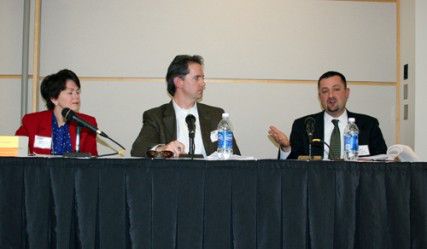
The Federal Communications Bar Association and Boston University’s College of Communication hosted a series of speakers yesterday to recognize Data Privacy Day, a federally recognized holiday on Jan. 28.
The FCBA aims to regulate personal privacy, said Greg Kennan, a steering committee member of the New England chapter of the FCBA who spoke at the beginning of the seminar.
The seminar featured keynote speaker Kathryn Ratté, a senior attorney with the Division of Privacy and Identity Protection in the Bureau of Consumer Protection.
“We think that as the data eco-system is growing more and more complex it’s more important than ever that consumers understand the implications of making information about themselves public,” Ratté said.
She said the staff of the Federal Trade Commission believes it is important that consumers realize the extent of personal data collection on the Internet and mobile phones.
“Little bits of data about you are being collected all the time,” Ratté said.
Ratté added that privacy concerns extend beyond social networking websites like Facebook.
The FTC’s first case concerning Internet privacy concerned Twitter. The FTC alleged that Twitter failed to keep private certain Tweets that users had designated as private.
“Twitter promised that they would offer certain security provisions to keep Tweets private, yet they failed to do so,” Ratté said.
A different case concerned the department store chain Sears when the company offered some of its customers a computer application that tracked their purchases and paid them $20 for the information.
Customers became angry when they found out that the application tracked all their computer actions, but Sears had actually disclosed their actions to these participants.
“On page 75, of a very, very long End User License Agreement, you could see that Sears was actually collecting information about everywhere you went on the web,” Ratté said. “Not only were they watching you, they were actually downloading the details of things like your bank statements, your video rental records, your prescription drugs.”
The FTC decided Sears had broken the law by burying crucial information deep in many pages.
“I think it’s the company’s fault,” said one Northeastern law student. “I don’t think you could put this on the consumer.”
Another Northeastern law student argued that it’s probably a blend of both.
“It’s something we’re all using, so it’s something that everybody should really be concerned about,” he said. “The truth of the matter is that you don’t fully understand that [the companies] are using this information for deception. Ignorance is not an excuse.”
Ratté said the FTC is working to improve the average person’s Internet privacy.
“We think that privacy notices should be clearer, more streamlined and easier to compare across business models,” she said. “We’d like companies to explore more standard terms, so consumers can understand them more easily.”
Ratté said one of the biggest concerns with social media is that consumers do not always anticipate the different ways that their information could be used and fail to realize that personal information remains accessible for years online.
“When you’re thinking about putting something out there, just ask yourself if this is something that you wouldn’t mind people looking at 10 years from now,” she said. “Just try to be more future-looking in terms of sharing data with others.”
The constantly changing nature of social media also presents the FTC with additional security concerns, Ratté said.
“We want to make sure that if there are changes being made to the privacy settings on these websites, they’re clearly communicated in a way that consumers can take action.”
This is an account occasionally used by the Daily Free Press editors to post archived posts from previous iterations of the site or otherwise for special circumstance publications. See authorship info on the byline at the top of the page.



